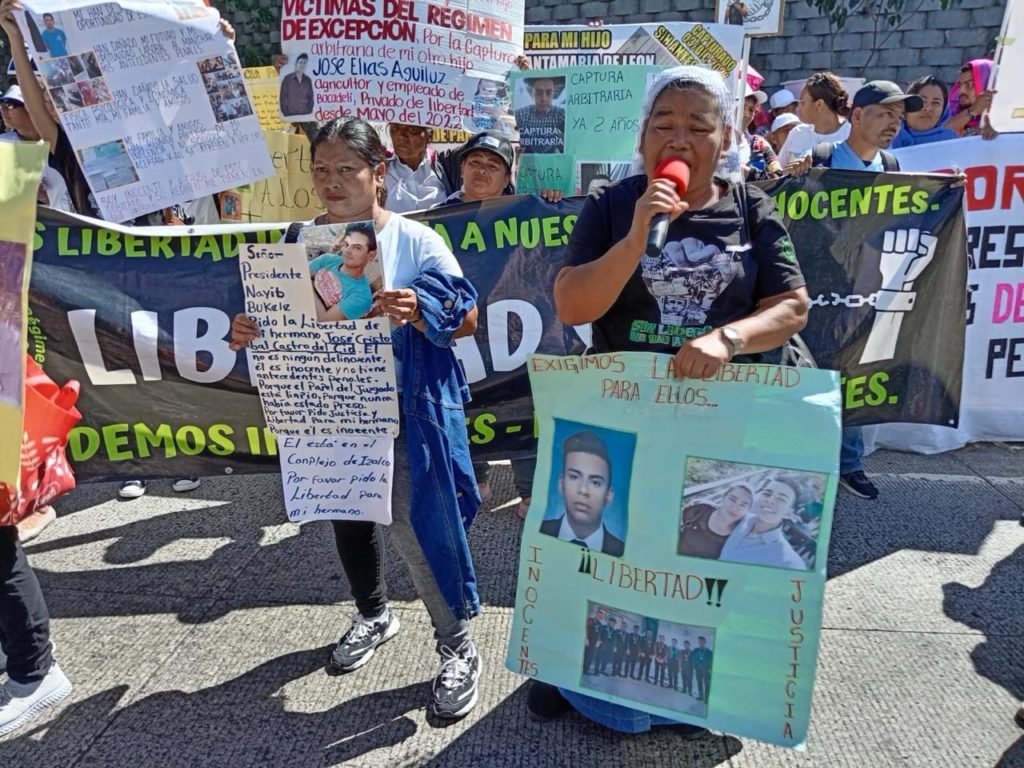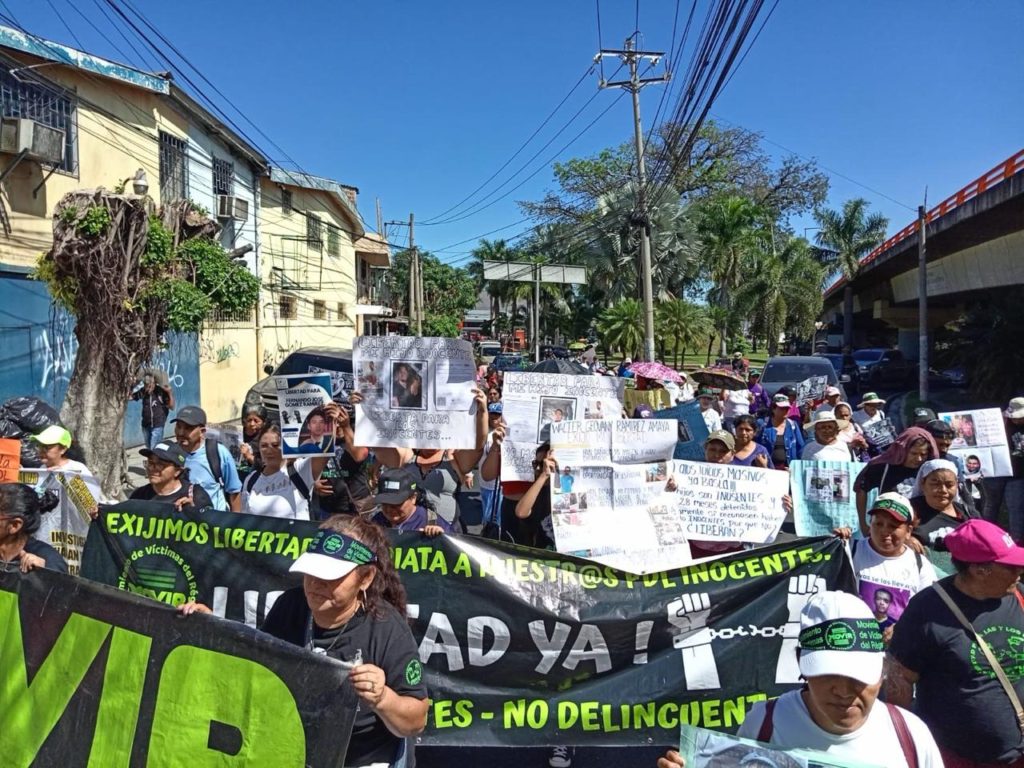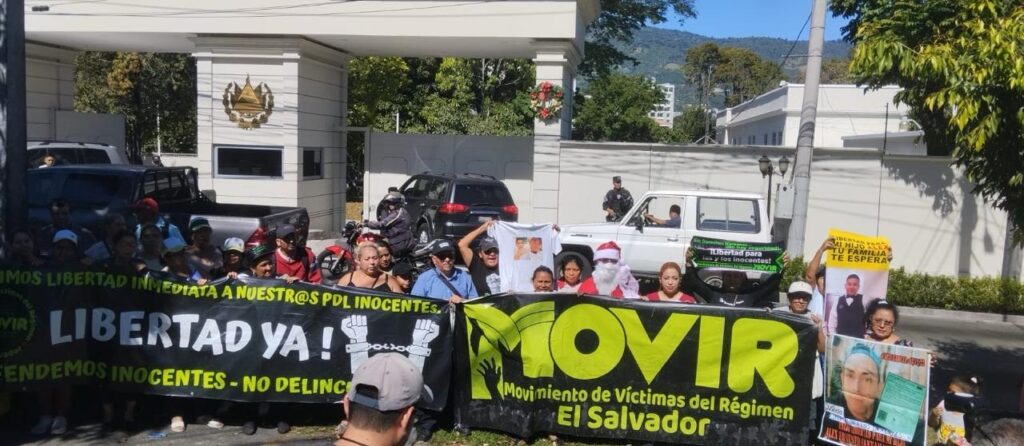Serious human rights violations during El Salvador’s state of emergency illustrate a systemic and widespread pattern of state abuses that have resulted in the arbitrary detention of thousands, policies of torture in detention centers, and hundreds of deaths in state custody.
Since the first state of emergency was declared on 27 March 2022, Amnesty International has been tracking developments and deployed five missions to the country to document serious human rights violations. After each visit, the organization confirmed that the situation of the victims and their families was gradually deteriorating, plunging the country’s human rights into a deeper crisis. The Salvadoran government has responded to accusations from human rights groups, protests from victims, concerns expressed by regional bodies and appeals from the international community with silence, indifference and a lack of transparency, further entrenching a pattern of repression and impunity.
Increased militarization, especially in marginalized, poor communities, recalls the horrific past experiences of using armed forces to suppress populations. This approach, coupled with the efforts of state institutions to stigmatize human rights organizations and a free press and thwart their efforts, contributes to a climate of fear and intimidation that stifles civil society and spurs self-censorship.
“The government’s so-called ‘peace’ is actually an illusion designed to hide a system of repression, a structure of control and oppression that abuses its power and ignores the rights of those who are already neglected, those who live in poverty, and in the country. Amidst the stigma, “marginalization – everything is defined in a very narrow way in the name of so-called security”, said Ana Piquer, Amnesty International’s Americas director.
The government’s so-called “peace” is actually a mirage that masks a system of repression, a structure of control and oppression that abuses its power and ignores the rights of those who have been ignored – living in poverty, under national humiliation, and marginalization—all in the name of so-called security, defined in a very narrow way.
Ana Piquer, Amnesty International Americas Director.
Pattern of arbitrary detentions and systematic violations
For more than 1,000 days, the Salvadoran authorities have relied on an exceptional temporary measure to detain more than 83,000 people, and have extended this measure 33 times to date without proper assessment or debate or any internal checks and balances. It became national policy.
Amnesty International’s interviews with members of the National Civilian Police (PNC), victims and their families, human rights organizations and victims’ movements show that many of the arrests were made under daily quotas, anonymous accusations and were discriminatory. . Factors such as having tattoos or living in a neighborhood that is stigmatized by poverty and gang violence. In more than 60 cases documented by the organization, no administrative or judicial orders or prior investigations were found to support these arrests.
In contrast, authorities used excessive force during arrests and a policy of mass detention that ignored international human rights standards such as the rule of law, the right to a fair trial, and the outright prohibition of torture and discrimination.
“Detaining people without evidence and subjecting them to mass trials is not justice; nor is it an effective or sustainable answer to the historic challenges facing security. Rather, it is an abuse that disregards human dignity. and perpetuates the suffering of those who have historically been marginalized by state policies,” said Ana Piquer, Amnesty International’s Americas Director.
Detaining without evidence and trying them en masse is not justice; Nor is it an effective or sustainable answer to the historic challenges facing security. Rather, it is an act of abuse that disregards human dignity and perpetuates the suffering of those who have historically been marginalized by state policies.
Ana Piquer, Amnesty International Americas Director.
Inhuman conditions and death in state custody
According to media reports, 1.8% of El Salvador’s population is imprisoned, the highest incarceration rate on the continent. According to the latest census figures, three out of every 100 men are in prison. This has led to an extreme overcrowding crisis in most prison centres, with some reaching more than 300% capacity since the imposition of the state of emergency, according to civil society organizations. Victims described it as “helllike”, characterized by a lack of medical care, substandard basic services such as food and water, and often cruel, degrading and inhuman treatment, including torture. According to local groups, more than 300 people have died in state custody. Amnesty International documented cases of death resulting from beatings, torture and a lack of adequate medical care.
“Every death in custody is a human tragedy and a systemic failure by the Salvadoran government to protect the lives of the people in its care,” Anna Pickel said. “Despite these allegations, the government failed to investigate The fact that these deaths occurred or that any measures were taken to guarantee justice and prevent future abuse is also worrying ”.
Every death in custody is a human tragedy and a systemic failure by the Salvadoran government to protect the lives of the people in its care.
Ana Piquer, Amnesty International Americas Director.
Since the state of emergency was first declared, the Bureau of Prisons has taken action to promote a policy of cruel and degrading treatment, including torture, within correctional facilities. According to local groups, and according to cases documented by Amnesty International, the bureau’s most senior officials obstructed the Office of the Human Rights Ombudsman’s oversight of prisons and the Forensic Institute’s medical inspections, even violating regulatory court orders. Furthermore, they have repeatedly ignored court rulings ordering the release of prisoners, committing serious violations of due process and human rights.
The fact that the government failed to investigate these deaths or take any steps to ensure justice and prevent future abuse, despite these allegations, is also concerning.
Ana Piquer, Amnesty International Americas Director.

“Security” without justice is meaningless
The lack of due process is shocking: large-scale trials, judges whose identities are concealed, and the absence of any effective competent defence, systematically violate rights such as the presumption of innocence and the right to a fair trial.
This scenario has been made possible by the gradual co-optation of the judiciary since 2021, which has weakened its independence, as well as the clear legal reforms promoted through the Legislative Council to pretext the approval of the legal framework. Allows and gives legitimacy to the suspension of a range of rights and due process safeguards. Key changes introduced include: automatic use of pre-trial detention for gang-related offenses without any case-by-case analysis of the need for this measure or other circumstances, such as to prevent serious crime or flight risk; removal of links to terrorist or illegal groups Pretrial imprisonment sentence limits for the offense in question. Such sentences can therefore apply indefinitely and violate the right to trial or release within a reasonable time limit.
Furthermore, the destruction of institutions responsible for ensuring Salvadorans’ right to defense, such as the Attorney General’s Office, further violates the right of those charged during the state of emergency to a competent defense, which was insufficient to begin with.
Likewise, no effective action has been taken by the prosecutor’s office or the judiciary The Office of the Human Rights Ombudsman investigating and safeguarding the rights of victims and their families are aspects that further worsen the situation of imprisoned persons.
Taken together, these actions and inactions by the state demonstrate a plan to jail thousands of people without proven gang affiliations.
“The extension of the state of emergency and its legal normalization testify to the worrying institutionalization of a policy of massive human rights violations. Security without justice and without protection of the innocent is not real security. Far from addressing the problem as a whole, the authorities , instead pushed the country to the edge of the abyss and trampled on the human rights of an entire generation. “The international community must take decisive action to ensure that the Salvadoran government takes responsibility and ends these systematic human rights violations.”
The international community must take decisive action to ensure that the El Salvadoran government is held accountable and to end these systemic human rights violations.
Ana Piquer, Amnesty International Americas Director.
The extension of the state of emergency and its legal normalization testify to the worrying institutionalization of a policy of massive human rights violations. Security without justice and without protection of the innocent is not real security. Instead of solving the entire problem, the authorities have pushed the country to the brink of abyss and trampled on the human rights of an entire generation.
Ana Piquer, Amnesty International Americas Director.

For more information or to arrange an interview, please contact [email protected]
Watch our Spanish documentary with Rolling Stone en Español


